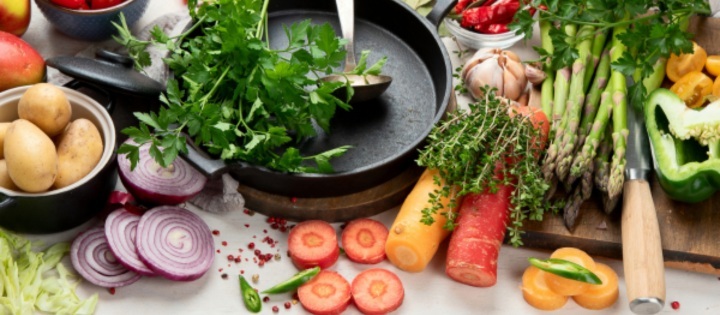In a world dominated by processed food and imported ingredients, the beauty and richness of local produce in Nigerian cooking is a powerful reminder of the flavours, nutrition, and sustainability found right at our fingertips.
Nigerian cuisine is deeply rooted in its environment, from the red soils of the East that yield cassava and cocoyam, to the lush fields of the Middle Belt where grains like millet and sorghum thrive. Each ingredient tells a story, and each dish is a celebration of the land and the labor of the farmers who cultivate it.
Join our WhatsApp ChannelFrom bustling city markets to quiet village farms, the journey of Nigerian food begins with an intimate relationship between people and their produce. It’s this farm-to-table philosophy, though ancient in practice, that is once again gaining recognition and appreciation in modern kitchens across the country.
The Power of Local Ingredients
Local ingredients are at the heart of Nigerian cooking. Think of the earthy richness of ugu (fluted pumpkin leaves), the bold heat of ata rodo (scotch bonnet), the depth of flavour in iru (locust beans), or the soothing starch of yam and plantain. These are not only everyday essentials but also culturally symbolic. For example, okra soup isn’t just a meal, it’s comfort, connection, and tradition in a bowl.
By using what is grown locally and in season, Nigerian meals naturally align with the rhythms of nature. This ensures ingredients are fresh, more affordable, and retain their maximum nutritional value. The result is food that is not only delicious but also healthful and environmentally friendly.
Economic and Environmental Benefits
Celebrating local ingredients also means supporting the local economy. When we choose home-grown rice over imported varieties, or locally harvested honey instead of foreign sweeteners, we empower farmers, vendors, and small-scale food processors. This strengthens food security and reduces our dependence on external food systems.
Environmentally, the benefits are immense. Local food travels shorter distances, reducing the carbon footprint associated with long-haul transportation. In addition, indigenous crops like millet, yam, and cowpea are naturally adapted to Nigerian climates and require fewer chemical inputs, making them more sustainable and resilient in the face of climate change.
Preserving Culinary Heritage
Nigerian cooking thrives on diversity; over 250 ethnic groups contribute to a wide variety of ingredients and recipes. From the fermented flavors of ugba and ogiri in the East, to the tangy tamarind used in northern Nigerian soups, local ingredients preserve not just flavor but identity. These foods are passed down through generations, anchoring communities to their roots and stories.
Farm-to-table isn’t just a modern health trend; in Nigerian homes, it has always been the norm. Farmers harvest produce in the morning, market women sell it fresh by afternoon, and families gather around steaming pots by evening. It’s a way of life that prioritises freshness, flavour, and connection.
Modern Revival of Local Foods
As Nigerian cities grow and globalisation expands our food choices, there’s a quiet revival taking place. More chefs, nutritionists, and food entrepreneurs are returning to indigenous ingredients and promoting their use in contemporary cooking. Millet pancakes, sorghum smoothies, yam flour pastries, and zobo-based drinks are making waves not just in homes but on restaurant menus and at food expos.
READ ALSO: Establishing Sustainable Healthy Eating Habits
Even supermarkets are increasingly stocking local spices, flours, and grains. Culinary schools are incorporating local ingredient knowledge into their curriculum. This not only promotes Nigerian food culture but ensures future generations value and understand their food heritage.
Eating with Intention
Choosing local is more than just a cooking decision, it’s a lifestyle. It invites us to know where our food comes from, to respect the seasons, and to eat with mindfulness. It means eating mangoes in the heat of March, celebrating yam festivals in August, and preparing hearty grain-based meals during the harmattan chill.
Cooking with local ingredients also opens up creative possibilities. It challenges us to explore beyond the common and discover underused gems like soursop, garden egg leaves, African walnuts, or fonio. These ingredients offer new flavours and benefits while keeping our food traditions alive.
Conclusion
From farm to table, Nigerian cuisine is a vibrant reflection of its land and people. In every slice of yam, every spoonful of ofada rice, and every sip of kunu, there is a connection to something greater, a shared culture, a sustainable future, and a culinary legacy worth preserving. Celebrating local ingredients isn’t just about food, it’s about pride, health, and honoring the roots that nourish us all.
Amanze Chinonye is a Staff Correspondent at Prime Business Africa, a rising star in the literary world, weaving captivating stories that transport readers to the vibrant landscapes of Nigeria and the rest of Africa. With a unique voice that blends with the newspaper's tradition and style, Chinonye's writing is a masterful exploration of the human condition, delving into themes of identity, culture, and social justice. Through her words, Chinonye paints vivid portraits of everyday African life, from the bustling markets of Nigeria's Lagos to the quiet villages of South Africa's countryside . With a keen eye for detail and a deep understanding of the complexities of Nigerian society, Chinonye's writing is both a testament to the country's rich cultural heritage and a powerful call to action for a brighter future. As a writer, Chinonye is a true storyteller, using her dexterity to educate, inspire, and uplift readers around the world.










